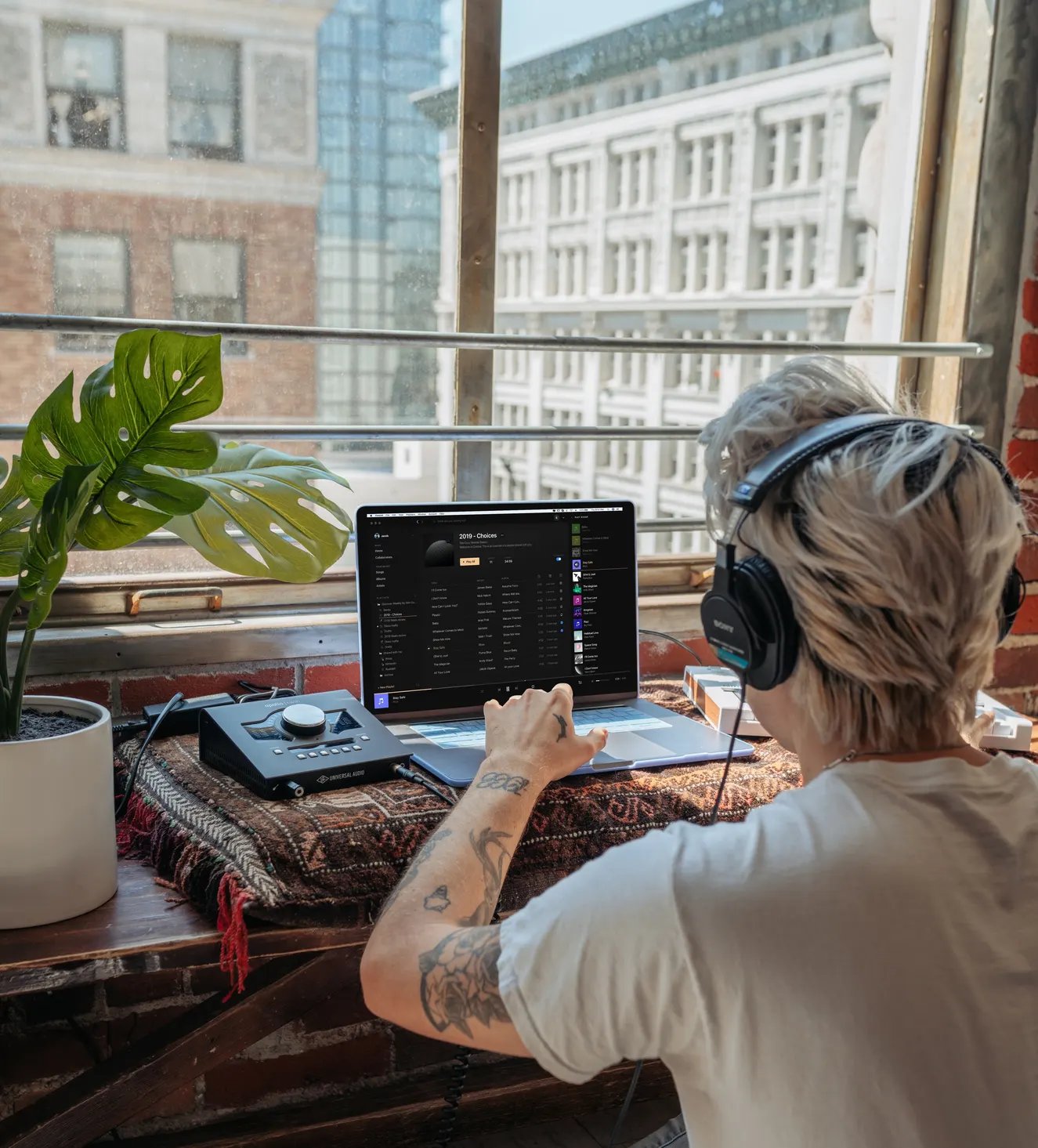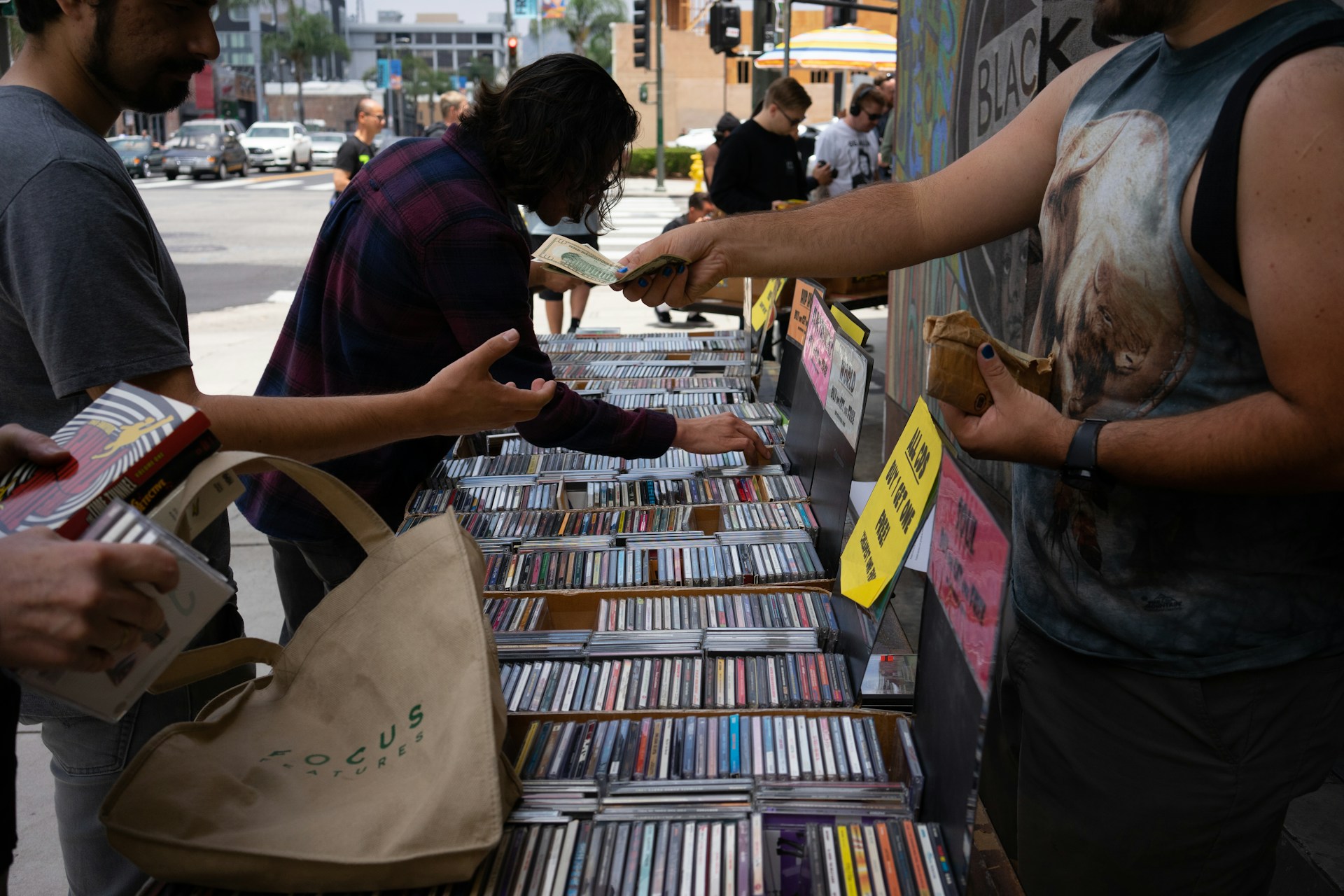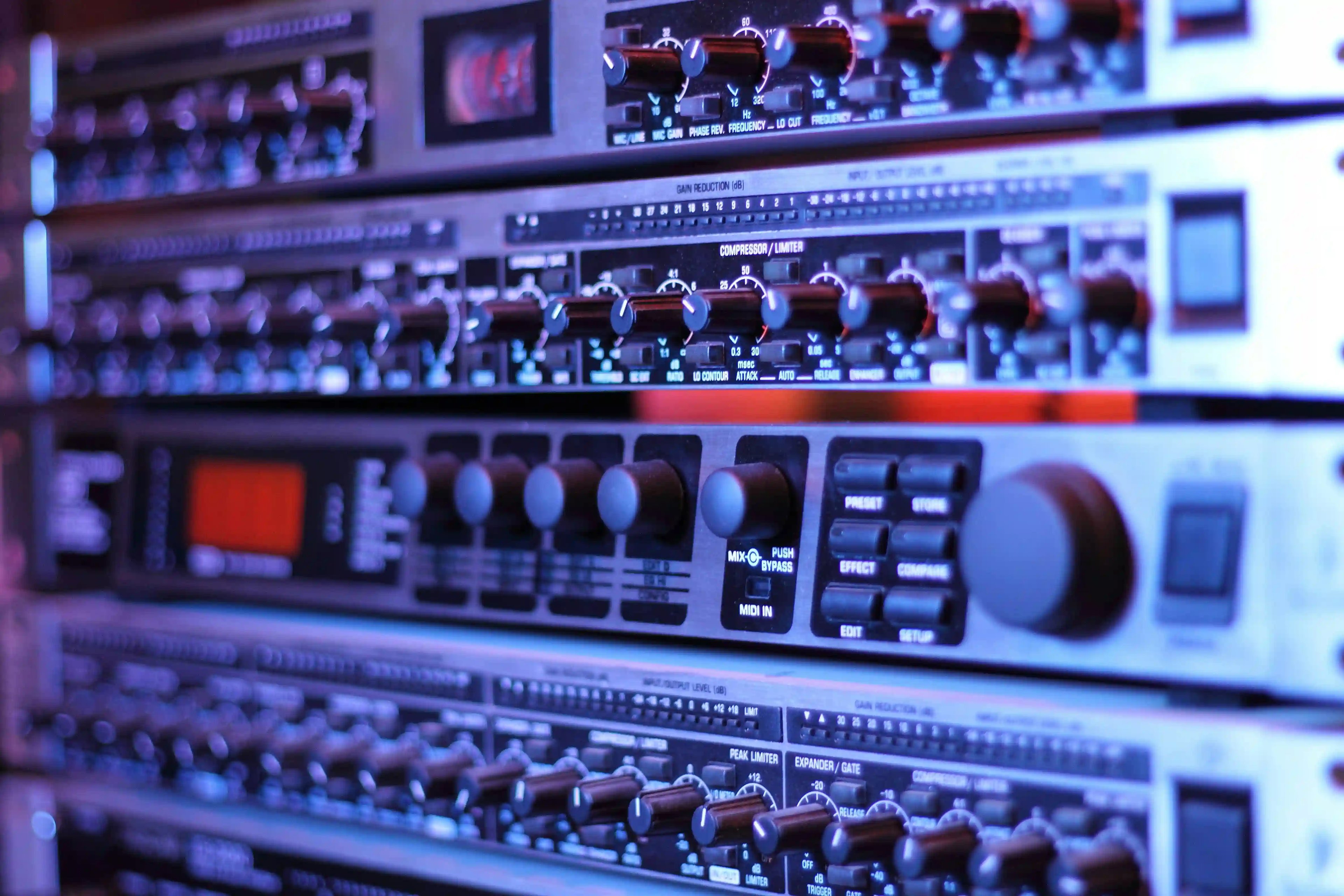Recording Label with Smart Music Contracts
The next-gen recording label, powered by smart contracts, offering music fans, collectors, and creators a groundbreaking way to discover, stream, and invest in unique tracks. Through a decentralized platform, users can access exclusive music while empowering creators with transparent monetization.

Our Mission
Redefine music ownership and accessibility
We envision a future where artists have full control over their creations, fans have direct and transparent access to the best releases, and the industry is reshaped through the innovative use of Ai and blockchain technology.
Enjoy our features
Embrace the fusion of music and technology
Music wallet setup made easy
Effortlessly set up your digital wallet with just your email for a seamless and secure experience, making transactions smoother than ever.
Discover the best music NFT collections
Dive into a variety of exceptional music collections available on our platform.
Collect your favorite music NFTs
Purchase fractions of your favorite music pieces for an affordable price, or own the entire masterpiece if you desire.
Free music download
Take your music videos with you wherever you go! Enjoy your music offline, without any restrictions. Start your personalized mp4 collection today.
Interactive Top Chart
Discover and influence trending creations - where user interactions like buying, streaming, and liking propel tracks up the charts.

Frequently asked questions
I'm a music creator. How can I get involved?
+
On which network are you based?
+
Do I need a wallet?
+
Why do I only see 1 mint of every MFT (Music NFT)?
+
Can I use my phone? Or is it better to use a PC?
+
Can I simply enjoy and listen to music on the platform without purchasing MFTs (Music NFTs)?
+
Blog
See all →
Unveiling the Ultimate Stellar On-Ramp
release
Unveiling the Ultimate Stellar On-Ramp: Get Lumens Instantly, Globally, Fee-Free! Hey Skyhitz fam! We’ve got massive news that’s about to remix how you experience music and crypto. Today, we’re dropping our brand-new Stellar on-ramp feature, and it’s a game-changer for artists, fans, and creators worldwide. Say hello to instant lumens (XLM) delivered straight to your Skyhitz account using just your email. No borders, no fuss, and no fees from us. Let’s break it down.Why This On-Ramp RocksAt Skyhitz, we’re all about empowering the music community with cutting-edge tools. Our new on-ramp, built on the Stellar blockchain, makes it effortless to join the decentralized music revolution. Here’s what makes it the best out there:Global Access: Wherever you are, New York, Tokyo, or Lagos, this works. One email, one payment, lumens in your account.Zero Skyhitz Fees: We take nothing. You only cover the card processing fee (as low as 2.9% + 30¢ for USD cards). More lumens stay in your pocket.Instant Delivery: No delays. Enter your email, pay, and your XLM lands faster than a beat drop.Seamless for Music Lovers: Use lumens to support artists, buy tracks, or power your Skyhitz experience, all in a few clicks.This isn’t just an on-ramp; it’s your VIP pass to the future of music, where creators and fans connect without middlemen.How to Use It: Your 3-Step MixReady to jump in? It’s as easy as hitting play on your favorite track. Here’s how:Go Straight to ItHead directly to https://skyhitz.io/top-up. Got an account? Great! If not, we’ll create one for you on the fly, just use your email. Or, log in and find the “Top Up” option in your dashboard.Enter Your Email & AmountType in your Skyhitz email and choose how much you want in USD (e.g., $10 gets you ~26.5 XLM, depending on rates plus a small card fee).Pay and PlayUse your card to complete the payment. Boom, lumens hit your account instantly. Now you’re ready to vibe with the Skyhitz ecosystem!Pro Tip: Check your wallet after payment to see your XLM balance update in real-time.Let’s Amplify the FutureThis is more than a feature; it’s a movement. Whether you’re an artist dropping your next hit or a fan fueling the creators you love, our on-ramp puts the power in your hands. No gatekeepers, no limits, just music and crypto, perfectly in sync.Join the BeatThe future of music is decentralized, and with Skyhitz, you’re leading the charge. Share this with your crew, try it out, and let us know what you think! Tag us @Skyhitz on X with #SkyhitzOnRamp, we’re hyped to see how you use it.Stay tuned for more updates, and keep creating, listening, and living the music life with Skyhitz. Let’s make waves together. 🌊🎶
Feb 21, 2025

Skyhitz Launch: Where Music Meets Smart Contracts
release
We’re thrilled to announce the launch of the new version of Skyhitz, the platform where artists and fans come together to discover, support, and share music NFTs, all while creating value for everyone involved. We designed it to harness the power of blockchain technology, specifically leveraging Stellar’s Soroban smart contracts, to make the process of interacting with music NFTs efficient, affordable, and rewarding.How It WorksWe connect musicians, NFT enthusiasts, and music lovers through a seamless platform where music NFTs from multiple networks can be discovered, collected and shared. Our mission is simple: to give artists a way to monetize their work while giving fans a stake in the success of the music they love. Here’s how it works:1. Free Account Setup: A new user only needs an email to create a free account. Once the account is created, they are assigned a public key and can fund it by transferring XLM to that public key.2. Music Streaming and Interaction: For every stream of a music NFT, 0.1 XLM is transferred to a smart contract and locked in escrow associated with that music NFT. For every like, 0.2 XLM is transferred and locked in the escrow of the music NFT. For every download, 0.3 XLM is transferred and locked.3. Investing in Music NFTs: Users can invest a minimum of 0.31 XLM in any music NFT to earn a percentage of its future revenue from streams, likes, and downloads. The returns are based on the Annual Percentage Rate (APR) generated by each NFT’s revenue. The higher the interaction with the NFT (streams, likes, downloads), the higher its APR and the higher the return for the investor.4. Dynamic Chart Driven by APR: Music NFTs on Skyhitz will move up the chart based on the highest APRs. The higher the revenue generated by streams, likes, and downloads, the higher the APR, and the more visibility the music NFT gets by rising to the top of the chart.5. Submit Music NFTs: Through our landing page, you just need your email and a link to the NFT. We will review it, and if accepted, you'll get rewarded.Soroban: Powering Efficient and Cheap TransactionsAt the heart of Skyhitz is Soroban, Stellar’s smart contract platform, which handles transactions efficiently and at a low cost. Soroban allows us to process music NFT transactions, including streaming, liking, and downloading, in a quick and secure manner, with minimal fees. For every transaction, Soroban ensures that payments are processed instantly and securely. With fees as low as 0.01 XLM per transaction, both artists and fans benefit from seamless interactions without high costs eating into their income.Rewarding Fans for Their ParticipationWe believe that fans should be more than just passive listeners, they should be actively rewarded for participating in the music ecosystem. Here’s how we do it:As fans engage with their favorite music, they create value for both themselves and the artists. Anyone can invest in music NFTs and earn returns based on the APR from interactions (streams, likes, and downloads). As more people interact with a music NFT, the higher its APR grows, allowing fans to benefit from the music’s success.A Money-Based Discovery System Where Everyone WinsSkyhitz introduces a money-based discovery system where the platform’s top-charting NFTs are driven by real engagement and investment:Artists win by earning revenue from streams, likes, and downloads. The more people interact with their music NFTs, the more they earn. Fans win by earning rewards for their participation and by investing in music NFTs with high APRs. As these NFTs grow in popularity, the value of their investments can increase. The platform thrives because it encourages real interaction and mutual investment. The highest APR music NFTs rise to the top, creating a transparent and performance-driven ecosystem.Our money-based discovery model ensures that both artists and fans are incentivized to actively engage with the platform, driving the success of the music and creating value for all participants.Join the Music RevolutionWe’re excited to welcome artists, fans, and crypto enthusiasts to Skyhitz. Whether you're an artist looking to monetize your work or a fan eager to support and earn from the music you love, Skyhitz offers a groundbreaking platform where music meets blockchain and everyone wins. Sign up today and start discovering music NFTs like never before. Together, let’s build the future of music!
Sep 18, 2024

How Music Got Free
business
Technology, Piracy, and the Future of the Music Industry In the ever-evolving landscape of the music industry, few narratives capture the seismic shifts and challenges as effectively as Stephen Witt's How Music Got Free. This book is not just an entertaining read; it's a profound exploration of how digital technology transformed music distribution, disrupted traditional business models, and forced a rethinking of how we value and consume music. As we delve into the core ideas of Witt's work, we'll also consider how these insights can guide the future of music services, ensuring artists receive fair compensation for their creative efforts.The MP3 RevolutionAt the heart of How Music Got Free is the story of the MP3 format, developed by Karlheinz Brandenburg. This technological breakthrough allowed for the compression of audio files without significant loss of quality, making it easier to store and share music digitally. The MP3's creation marked the beginning of a new era, where music could be distributed globally with unprecedented ease. However, this technological advance also opened the door to widespread piracy, fundamentally challenging the music industry's existing paradigms.The Impact of PiracyOne of the book's most compelling narratives is that of Dell Glover, a factory worker who leaked thousands of albums online from a CD manufacturing plant. Glover's actions, along with those of piracy groups like RNS (Rabid Neurosis), illustrate the profound impact of digital piracy on the music industry. These insider leaks and the rise of file-sharing networks like Napster disrupted traditional revenue streams and forced the industry into a defensive posture, initiating legal battles and prompting a reevaluation of distribution strategies.Music is FreeDaouda Leonard, legendary music business manager, has articulated a crucial aspect of the modern music industry: Music is Free. This idea captures the essence of how technological advancements have shifted the perception and reality of music distribution. Historically, creating, distributing, marketing, and monetizing music involved significant costs, controlled by the music industrial complex. The rise of digital audio workstations (DAWs), pay-to-upload distribution services, social media, and streaming services has democratized these processes, making distribution almost cost-free in the minds of consumers.The disruption caused by rippers and platforms like Napster forced the traditional gatekeepers to cede control. Today, mainstream consumers primarily see music as a subscription service expense, often bundled into other digital costs. This shift means that while music is psychologically free, new business models must incentivize people to pay more directly for music, beyond just subscriptions or occasional ticket and merchandise purchases.The Industry's Response and EvolutionFaced with the threat of digital piracy, the music industry initially responded with lawsuits and attempts to clamp down on illegal file-sharing. However, as Witt's book highlights, these efforts were only partially successful. The real breakthrough came with the industry's eventual embrace of digital distribution through platforms like iTunes and streaming services such as Spotify. These innovations have reshaped the business model, shifting from ownership to access and subscription-based services.Cultural Shifts and Consumer BehaviorWitt also explores how the democratization of music access through piracy changed consumer behavior and the cultural landscape. The era of free music downloads eroded the notion of paying for music, leading to a culture where access was expected to be instantaneous and free. This cultural shift has had lasting effects on how music is valued and consumed, influencing the development of new business models that prioritize user convenience and accessibility.Looking Forward: Supporting Artists in the Digital AgeAs we reflect on the lessons from How Music Got Free, it's clear that the music industry's future lies in balancing technological innovation with the protection of artists' rights. Here at Skyhitz, we believe the best way to support artists is by creating services that not only provide innovative ways to distribute and enjoy music but also ensure that creators are fairly compensated. By leveraging technology, we can develop new revenue streams and business models that prioritize the value of artistic work and sustain the music ecosystem.To address the notion that music is free, we need to engage fans more in the distribution process and the rise of new artists. By exploring and implementing new business models, we can leverage the power of the community to create sustainable pathways for artists in the digital age. This means not only relying on subscriptions but also finding creative ways to encourage direct support for artists through new behaviors and engagement methods.In conclusion, Stephen Witt's How Music Got Free offers invaluable insights into the transformative impact of digital technology on the music industry. As we navigate this ever-changing landscape, it's crucial to remember the lessons of the past and strive to create a future where technology and artistry coexist harmoniously, ensuring that music continues to thrive in all its forms. By understanding the history and challenges detailed in Witt's book, we can better appreciate the importance of innovation and fairness in the music industry. At Skyhitz we work to create a future where artists are rightfully rewarded for their creativity, and fans continue to enjoy the music they love in new and exciting ways.
Jun 25, 2024